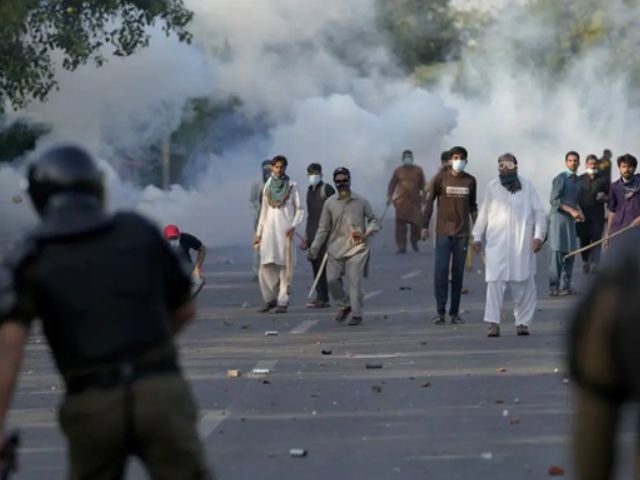ISLAMABAD:
As anti-terrorism courts begin to hand down verdicts in the May 9 riot cases, the political stakes for the Pakistan Tehreek-e-Insaf (PTI) and its founding chairman, Imran Khan, are not only intensifying but also entering a new phase of vulnerability.
The reported conviction of a sitting PTI Member of the National Assembly, among others, marks more than just a legal precedent as it signals the beginning of a mounting pressure campaign on the party, just as it readies itself for yet another attempt to reclaim the streets.
But before PTI can reignite its street power, it must first grapple with three compounding challenges: tightening legal nooses, growing internal disarray exacerbated by Imran Khan’s incarceration and isolation, and a widening gulf between the party and the powerful quarters.
Taken together, these dynamics have left the party politically disoriented, legally cornered and strategically adrift.
The May 9 violence, sparked by the arrest of PTI’s newly-designated patron-in-chief in a corruption case, unleashed unrest across the country, including unprecedented attacks on military installations.
The state’s response was swift and sweeping, with a crackdown leading to the arrest of dozens of leaders and supporters, many now facing anti-terrorism charges.
As convictions begin to roll in, political analysts believe the cost of staging fresh agitation is growing by the day.
Ahmed Bilal Mehboob, president of the Pakistan Institute of Legislative Development and Transparency (PILDAT), sees this as a pivotal moment.
“The government and the establishment have emerged stronger and more confident, especially after the recent [Pak-India] four-day war,” he said, adding “the support for agitation against government & establishment by PTI and its allies has also suffered further setback”.
Commenting on the convictions’ aftermath, the PILDAT chief noted that there was a greater likelihood for harsher punishment for 9 May accused persons, adding, “This judgment is indicative of the future trend of tougher actions”.
Mehboob felt that the vacuum at the top was another factor compounding the legal challenges for both Khan and the party.
Regarding the question of whether PTI’s call for protest would gain traction, especially after the patron-in-chief first called for talks with the establishment and then announced a protest movement from jail, Mehboob felt that Imran Khan suffers from a lack of clarity in communication because he is unable to communicate directly from behind bars.
He noted that the visitors narrate Khan’s point of view with a slant reflecting their personal views, which are often contradictory.
“Apparently, there is no clear and well-considered policy which the party has decided to follow,” he said while listing down the reasons for constantly getting confused signals from PTI.
Mehboob said it shows a confused state of mind, which is quite natural in a situation where “the supreme leader is behind the bar and isolated; and the rest of the party officials lack the trust and authority to take a decision as Khan can embarrass and snub them any time”.
Meanwhile, PTI’s relationship with powerful stakeholders has hit a new low.
One example of it was witnessed when the party was excluded from a high-level field marshal’s dinner to celebrate victory in the recent war, which the experts believe was a symbolic but telling snub.
The only invitation extended to PTI was sent to Khyber Pakhtunkhwa Chief Minister Ali Amin Gandapur. Still, he skipped the event to attend a party meeting discussing Khan’s release – an act that was seen by some as defiance, but by others as a missed opportunity.
“PTI should decide to either act as a “revolutionary” party by opting for the path of street agitation (which, in my opinion, may be a suicidal path) or act as a responsible political party which rules a province and may rule the country again,” Mehboob said.
He said that PTI should not miss its official duties as a large political party and as the government of the province, and participate in all such state ceremonies and meetings as the dinner hosted by the field marshal. “Trying to ride in two boats may land the party in mud,” he concluded.
While sharing his views on the challenges being faced by PTI, Professor Tahir Naeem Malik of NUML University said that the verdict in the May 9 cases made it absolutely clear that the state was not going to go easy on PTI.
“The May 9 verdicts are not just legal judgments,” the professor noted, “they’re part of a broader message that the state intends to draw a hard line.”
Commenting on Khan’s desire to hold direct talks with the establishment, which was swiftly followed by his announcement to begin a new protest movement, Professor Malik said that it was a result of a lack of coordination among the party leadership, as they do not get frequent opportunities to devise political strategies amid changing circumstances.
“The top leadership is in jail and unable to take stock of the rapidly changing situation while those outside can’t make decisions on their own,” Professor Malik said, “this has created confusion whether to negotiate or resist; hence, facing paralysis.”
Nonetheless, Malik said that the support from voters is still there for PTI, but it seems the party’s ability to turn that into action has reduced, adding that slogans alone won’t be enough without proper coordination and a clear plan.
On rifts, he said, with some form of reconciliation or reset, it’s hard to see how PTI regains political space through traditional channels.

